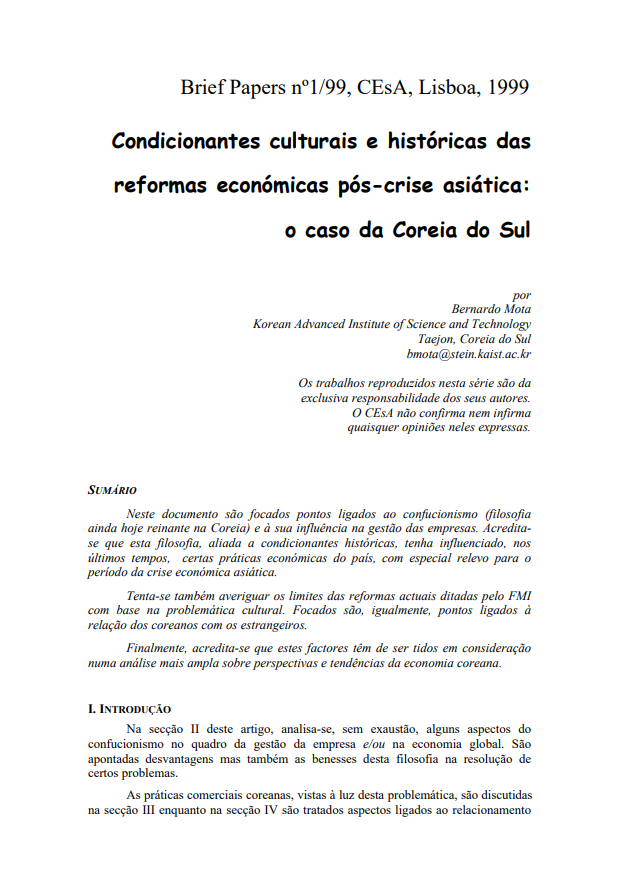Brief Paper 1/1999: Condicionantes Culturais e Históricas das Reformas Económicas Pós-crise Asiática: O caso da Coreia do Sul

Title: Brief Paper 1/1999: Condicionantes Culturais e Históricas das Reformas Económicas Pós-crise Asiática: O caso da Coreia do Sul
Author(s): Mota, Bernardo
Publication Date: 1999
Publisher: ISEG - CEsA
Quotation: Mota, Bernardo. 1999. "Condicionantes culturais e históricas das reformas económicas pós-crise asiática : o caso da Coreia do Sul". Instituto Superior de Economia e Gestão – CEsA Brief papers nº 1-1999
Abstract: This document focuses on points related to Confucianism (philosophy still reigning in Korea) and its influence on the management of companies. It is believed that this philosophy, combined with historical constraints, has influenced, in recent times, certain economic practices in the country, with special emphasis on the period of the Asian economic crisis. It is also attempted to ascertain the limits of current reforms dictated by the IMF based on cultural issues. Focused are also points related to the relationship of Koreans with foreigners. Finally, it is believed that these factors need to be taken into account in a broader analysis of prospects and trends in the Korean economy.
Identifier: http://hdl.handle.net/10400.5/2079
Category: Working paper
Abstract:
In Condicionantes Culturais e Históricas das Reformas Económicas Pós-crise Asiática: O caso da Coreia do Sul, we focus on Confucianism (a philosophy still prevailing in Korea) and its influence in the management of companies. It is believed that this philosophy, together with historical conditions, has influenced certain economic practices in the country in recent times, with special emphasis on the period of the Asian economic crisis. An attempt is also made to investigate the limits of the current reforms dictated by the IMF on the basis of cultural issues. It also focuses on the relationship between Koreans and foreigners. Finally, it is believed that these factors have to be taken into consideration in a broader analysis of prospects and trends in the Korean economy. It is believed that in an economic or financial analysis of the Korean (and Asian) crisis, its consequences and the outcome of reforms it is indispensable to take into account cultural and historical factors and social specificities. Confucianism is the most influential of these features. Some points of its influence on economic decision-making are reviewed. Certain Confucian features are believed to act as catalysts for economic recovery, and should not be completely dismissed as anachronistic. Korea could become a model of development, combining, in an original way, such divine variables as Confucianism, globalisation and economic liberalisation, on condition that a certain rigour in administration is introduced. Finally, I am convinced that a Confucian society is not incompatible with economic and democratic development in an increasingly global environment.
Quotation:
Mota, Bernardo. 1999. “Condicionantes culturais e históricas das reformas económicas pós-crise asiática : o caso da Coreia do Sul”. Instituto Superior de Economia e Gestão – CEsA Brief papers nº 1-1999





